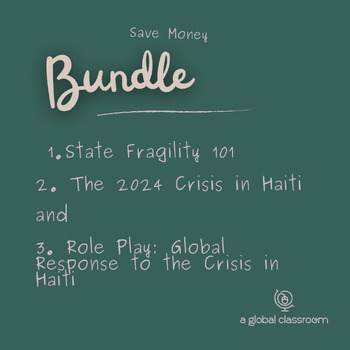Fragile State Case Study: Haiti 2014 - IB Global Politics
- Zip
- Google Apps™

Products in this Bundle (3)
Description
This bundle includes three lessons. Each lesson requires between 1-3 hours, depending on how much is completed in class, or at home.
The first lesson explores the concept of state fragility, including the characteristics and causes of fragile states. Students explore the concept through some discussions, video analysis, reading excerpts, and a brief case study (Haiti).
The second lesson is a deep dive into fragility in Haiti. It focuses on the political turmoil, gang violence, and humanitarian needs facing the nation.
The third lesson, is a role play, where students take on the role of current state and non-state actors to discuss and debate how the global community should respond to the crisis in Haiti, and whether or not they support a Kenyan-led Multinational Security Mission.


